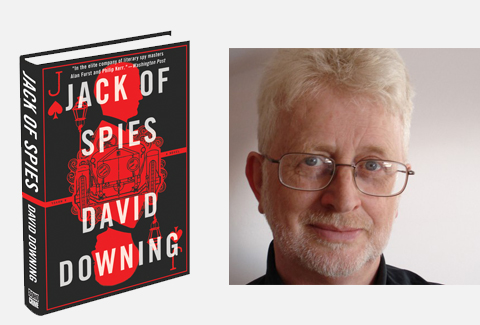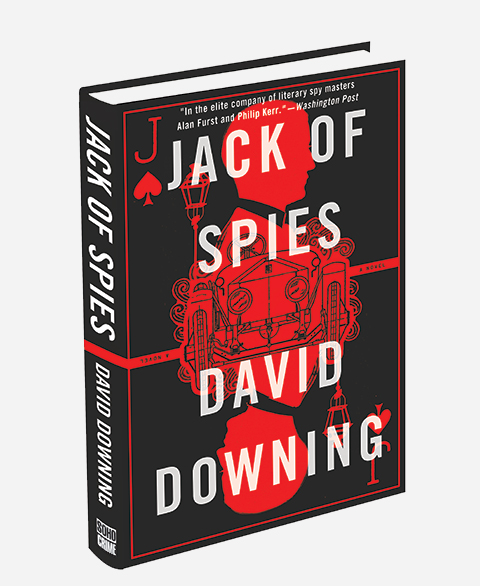
The critically acclaimed “Station Series” may be over, but David Downing’s complex and thrilling new novel takes us back to the beginning—to the eve of the First World War and the birth of the modern spy.
It is 1913 at the beginning of Jack of Spies and a globe-trotting luxury automobile salesman named Jack McColl is putting his military background and ear for languages to work for the fledgling Royal Navy intelligence services. The world is on the brink of calamity, as the UK, Germany, and Europe inch closer to the First World War and Jack is about to find himself a player on the biggest of stages.
It starts out simple enough. While in China showing the spectacular bottle green Maya automobile to the wealth of empires, Jack takes strolls around the harbor to note the coming and going of ships, snaps the occasional photo, and even pays prostitutes to tell him the pillow talk of the German navy. The Royal Navy’s pay isn’t enough to retire on, but it is extra, and Jack is living out a lifelong fantasy as an agent of the British Empire.
But Jack’s sporting interest in spy-craft soon leads him deep into a deadly game of cat and mouse with profound strategic implications for the Empire. It hasn’t always been about god and country for Jack and as the stakes get higher, his Majesty’s service is asking increasingly questionable things of him. His passionate love affair with an American suffragette and journalist named Caitlin Hanley is sincere, yet Jack can’t help but realize that at some point he may have to betray her confidence. Caitlin is from a long line of Irish independence activists, and her journalism often shows signs of sympathy to Irish and Indian revolutionary causes—two political movements the Germans are willing to exploit to further destabilize the British Empire. They’re also two causes that Jack is not without his own sympathies for.
Set across oceans and continents, steamliners and cross-country trains, Jack of Spies always fascinates as David Downing once again proves an ideal tour guide to the folly of empires and the birth of that most fascinating of 20th century characters—the spy.
* * *
Get to Know David Downing
“I grew up in north-west London, in what was then the white middle-class suburb of Harrow. My parents, both dead now, were emotionally distant but otherwise benign, and I was blessed with a younger brother who is still one of the nicest people I know. Growing up, I developed passions for soccer, railways, rock music and politics which have stayed with me ever since. The only subjects which interested me at school were geography and history, and one teacher of the latter, in showing me that the past was something to interpret and argue over, rather than something to ‘learn,’ has proved a life-long inspiration. Rather inauspiciously for a future writer, I failed the Use of English exam. Indeed, my pre-university reading rarely rose above the level of The Saint and James Bond.
I was interviewed at Sussex University for a place to study Geography, and after arguing the rights and wrongs of the Vietnam War with my interviewers, was persuaded to switch to International Relations. Six years of free higher education followed, in which I gained a BA and MA, and failed to complete a PhD on Che Guevara’s economic ideology. By this time I was much more interested in reading serious fiction, writing Dylanesque poetry and listening to music than pursuing academic studies.
My first writing jobs were as a rock critic; my first book was on visions of the future in rock music. The second was a military history of the Second World War, which I followed a few years later with a fictional account of a war that might have been. Over the succeeding forty years I have explored and sometimes interwoven these three themes of contemporary culture, twentieth century history and fiction.
In 1974 I traveled overland to India (and back) via Iran and Afghanistan, and felt at the time that the trip was some sort of rite of passage. It certainly gave me a taste for that kind of traveling—buses, trains and cheap hotels—and I would later enjoy long journeys through South America and Mexico.
For most of the ’70s and ’80s I lived in inner north London, much of that time with my first long-time partner. After we parted company I spent several years in northeast London, then moved to Boston, Massachusetts, to be with my current wife, Nancy. We returned to Britain five years later, and have lived outside London ever since. She is a practicing acupuncturist and a student of the history of Chinese medicine.
Through the 1990s and 2000s my work followed its usually erratic course. My first real novel, The Red Eagles, had been published in the US in 1987, but no one was interested in the three I wrote thereafter. A biography of Neil Young was followed by umpteen special forces thrillers written under a pseudonym, three books on football history, and over forty history books for children, before Soho in the US and Old Street in the UK took a chance on what would be the first of six ‘Station’ thrillers set before, during and after the Second World War. I am now writing what I hope will be an equally long series set around the First.
Over the last decade, Nancy and I have slowly renovated a ruined cottage in France, and we now plan to spend more of our time there, growing vegetables, drinking wine, and enjoying books and films which have so far eluded us.”
* * *
Pre-order Jack of Spies by David Downing
